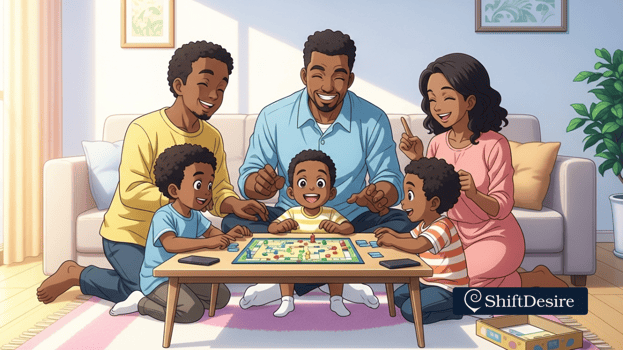The Role of a Present Parent in Emotional Development
By–Sevs Armando – ShiftDesire


She Was There... But Not Really
Emily sat at the kitchen table, sipping coffee, answering work emails on her phone. Her 9-year-old son, Noah, sat just a few feet away.
“Mom... do you think I’m annoying?”
She didn’t even look up.
“No, honey, you’re fine...” she muttered, half-distracted.
Noah went quiet. He stared at his tablet, his face falling, a question left unanswered.
That was the moment Emily realized something heartbreaking later that night:
“I was physically there... but emotionally? I was miles away.”
Why Your Presence Matters More Than Ever
In a world drowning in screens, noise, and distraction, what children crave most isn’t the newest toy, app, or trending video.
It’s this:
A parent’s full, present attention.
When parents are emotionally available, it’s not just about feeling loved.
It directly impacts:
Emotional resilience
Self-esteem
Decision-making skills
Ability to navigate online dangers
Being present isn't just warm and fuzzy.
It’s child protection. It’s internet safety for kids. It’s raising safe kids in a digital world.
How Emotional Absence Leads to Bigger Risks
1. Disconnected Kids Seek Connection Elsewhere
When parents are emotionally absent — even unintentionally — kids often turn to:
Social media validation
Strangers in gaming chats
Influencers who don’t always have healthy values
✅ What to Do:
Create *“No Phone” zones during meals, bedtime, and car rides.
Offer 10-minute daily check-ins where the child leads the conversation.


2. Lack of Presence Weakens Boundaries
Kids learn what’s acceptable by watching us. If our attention is fragmented, boundaries around screen time, content, and values blur.
✅ What to Do:
Narrate your decisions: “I’m putting my phone away now because you’re more important.”
Hold family meetings about screen rules — and apply them to yourself, too.
3. Unseen Kids Become Vulnerable to Sexual Content in Media
Without open dialogue and active presence, kids are more likely to stumble into harmful content — or worse, not come to you when they do.
✅ What to Do:
Have proactive talks about online dangers before exposure happens.
Teach them the phrase: “If it feels weird or confusing, come talk to me — no trouble.”


5 Ways to Be a More Present Parent — Starting Today
1. Tech-Free Presence
Meals, bedtimes, and school pickups = no screens.
Let them see you prioritize them over your phone.
2. Micro-Moments Matter
Eye contact when they speak.
Celebrate little wins: “You built that Lego? Wow — tell me more.”
3. Ask Open-Ended Questions
Instead of “How was school?”, try:
“What was something that made you smile today?”
“Did anything confuse or bother you today?”
4. Co-Play and Co-Watch
Sit with them during YouTube, gaming, or Netflix.
Comment, laugh, ask questions — be part of their digital world.
5. Model Emotional Availability
Share your feelings, too:
“I felt really stressed today, but talking to you makes me feel better.”


Warning Signs Your Child Feels Emotionally Disconnected
🚩 Emotional Withdrawal
Stops sharing feelings
Seems disinterested in family time
🚩 Digital Escapism
Obsessed with screens
Avoids offline activities
🚩 Attention-Seeking Online
Posts or shares things for validation
Connects with strangers in chats or games
These aren’t random behaviors. These are quiet cries for connection.
You Are The Anchor in a Stormy World
You don’t have to be perfect.
You don’t have to delete every app or move off the grid.
But you do have to show up.
Fully. Consistently. Emotionally.
Because every moment you look into their eyes...
Every time you choose “I’m listening” over “Just a second...”...
You’re not just raising a child.
You’re raising a safe, secure, emotionally resilient human being.
👉 Start Today:
Turn off your phone for 30 minutes and ask your child: “What’s something you’ve wanted to talk about but didn’t?”
Share this article with fellow parents who need this reminder.
